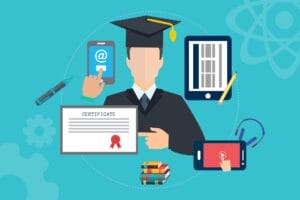 In the world of information texts and fiction, there are three schools of thoughts when using information.
In the world of information texts and fiction, there are three schools of thoughts when using information.
Some educators believe that all information is copyrighted and will not breach copyright, and will purchase everything to use. Some educators believe that everything on the Internet is free to use and will use what they want for education or personal use. Some educators take the time to learn about the various licences by Creative Commons and look carefully at the accessibility of the resources.
Many educators and librarians play it safe by using copyrighted materials or completely free websites but hardly venture out to use OER (Open Education Resources) because we know very little about the OER.
What is OER?
OER is Open Education Resources. According to Unesco, “Open Educational Resources (OER) are teaching, learning and research materials in any medium – digital or otherwise – that reside in the public domain or have been released under an open license that permits no-cost access, use, adaptation and redistribution by others with no or limited restrictions. OER form part of ‘Open Solutions’, alongside Free and Open Source software (FOSS), Open Access (OA), Open Data (OD) and crowdsourcing platforms.”
What is the difference between Copyrighted Material and OER?
The publishing world believes that a lot of talent, creativity, and work goes into producing new ideas and products. Therefore, it is only fair for the creators and the publishers to receive a price for their work, just like any other services. Publishers business expect all copyrighted, published texts to be purchased. Through copyright laws, publishers can help protect the creator’s intellectual property, whether they are words or music or videos.
According to UNESCO: Open access means that
- “Its content is universally and freely accessible, at no cost to the reader, via the Internet or otherwise;
- the author or copyright owner irrevocably grants to all users, for an unlimited period, the right to use, copy, or distribute the article, on condition that proper attribution is given;
- it is deposited, immediately, in full and in a suitable electronic form, in at least one widely and internationally recognized open access repository committed to open access.”
Benefits of OER:
- With an increase in technology use in India, the OER can cater to students educational needs, especially for the disadvantaged society
- Open educational resources include complete courses, course materials, modules, textbooks, streaming videos, tests, software, and any other tools, materials, or techniques to support access to knowledge and learning to all at any time.
Nayantara Padhi’s research paper describes how college professors and educators are open and respectful of OER. Due to the lack of technology resources and lack of understanding of copyright and plagiarism, there is a hesitation to use OER in India. Little experience and support from the Heads of Institutes also reduce the opportunity to use OER.
Many developed countries like the USA and Australia are very serious about promoting open educational resources. India is working very hard to build an OER and are serious about it, and is developing. Currently, OER in the school education field hardly exists since textbooks drive school education. The OER sites by the government are hard to navigate. They are not as robust as the Khan Academy and others.
Does traditional teaching stifle intellectual growth?
The new National Education Policy 2020 has encouraged collaborative, conceptual teaching and learning, emphasizing communication, critical thinking, deep literacy connections, learning science and mathematical concepts. In a fast-changing world, traditional schooling does not work. All memorization is not the answer to the practical use of education in the real world.
So, when teachers are encouraged to use OER instead of textbooks, creativity and information learned can become valuable. For example – learning about different waste management systems from various sources and finding alternatives, solutions and advocating for their use is far more valuable than simply memorizing waste management methods.
How can Librarians & Educators support OER?
Technology with information has taught us that learning does not stop in schools and universities. Having the right mindset and the desire to learn can propel the individual to grow in knowledge and skills. Librarians and educators who continue the lifelong habit of learning inspire others to succeed. All education is available on the Internet with zero fees. So, therefore there is no excuse for learning. Sharing success stories of OER teaching and learning can help others grow and learn.
Misunderstanding of OER?
Some individuals believe that OER is not authentic or the information is incorrect. Some are also of the belief that the OER value of learning is not up to the mark. If you take a Harvard Certificate and do not put the education into practice, it is not worth it. If you develop skills and knowledge through an OER, transform and practice, there is nothing to stop one from growing and learning. All soft skills or knowledge put into practice is the only way to succeed. Therefore, looking carefully into the OER and the sources can be important too.
“Wisdom is not a product of schooling, but of the lifelong attempt to acquire it.” – Winston Churchill.
Teacher Resources
Diksha Platform for CBSE Schools (Indian)
World largest lesson plans based on SDG (Unesco)
Storyweaver stories for students in school (Pratham eBooks)
Teacher Education School-based support (TESS Indian)
American English resources
Neptel (MHRD Project)
CK-12 Curriculum Resources (Indian)
Ed-X Resources (A collaboration of International Universities)
Phet Interactive Simulations for Math and Science (US)
Enrich Math (University of Cambridge)
Edutopia – Educational Pedagogy (Trusted sources for education pedagogical views)
Role of School Librarians in Curating OER